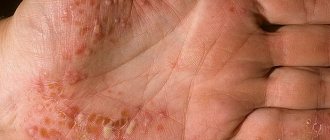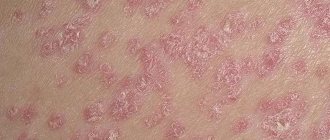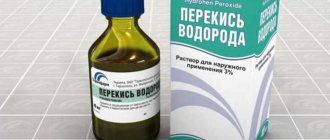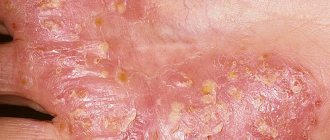be careful
People with psoriasis often try to eliminate the external symptoms of the disease on their own before going to the doctor, without thinking about the fact that the problem actually comes from within. Some patients manage to achieve an external positive result for some time. But inside the body at this time, psoriasis continues its attack on the autoimmune system, provoking the appearance of severe illnesses, in some cases fatal.
It should be noted that psoriasis can cause cancer. Therefore, in the case of this disease or suspicion of it, self-medication is unacceptable.
Symptoms and diagnostic criteria
With the help of modern diagnostic tests, it is possible to determine psoriasis with maximum accuracy and find out the causes of its occurrence. At the same time, it is extremely important to conduct a competent examination and carry out the necessary tests, since psoriasis in its symptoms differs little from eczema and allergic manifestations, which require slightly different therapy.
Correct determination of the diagnosis, the nature of the disease and its cause is subject to only a qualified specialist.
Initially, the dermatologist examines the patient.
Among the external manifestations of psoriasis, the following signs are noted:
- The psoriatic triad is clearly visible, accompanied by stearin spots, psoriatic film and pinpoint bleeding after its removal.
- The skin is actively peeling off and itching a lot.

In addition, the doctor should pay attention to the following points:
- The patient’s lifestyle – his leisure time, nutrition, exercise, the amount of time allotted for rest.
- Presence of chronic diseases.
- Stage of development of the disease. Its progressive form is characterized by the formation of new papules, noticeable abrasions and scratches on the skin.
Tests for psoriasis
It is worth noting that the above points are not enough to finally make the correct diagnosis. It is very important to carry out the necessary examinations and tests.
The picture of psoriasis can be clarified using the following research methods:
- General blood analysis. Basically, there are no major changes to the formula. In addition, there is an increase in ESR levels, which usually happens during inflammatory processes in the body. In addition, the doctor pays attention to the condition of leukocytes. In a blood test for psoriasis, especially in its complex forms, anemia is often visible.
- A biochemical blood test for psoriasis is characterized by a negative indicator for rheumatoid factor. In addition, there is an increase in protein levels.
- Liver tests for psoriasis show that there is a malfunction in this organ.
- Blood tests for cholesterol and glucose levels must be taken to see deviations from the norm.
- Analysis of stool for parasites, intestinal infections and dysbacteriosis.
- Urinalysis, which checks the water-salt balance.
- A blood test for HIV, since this disease can trigger the appearance of psoriasis.
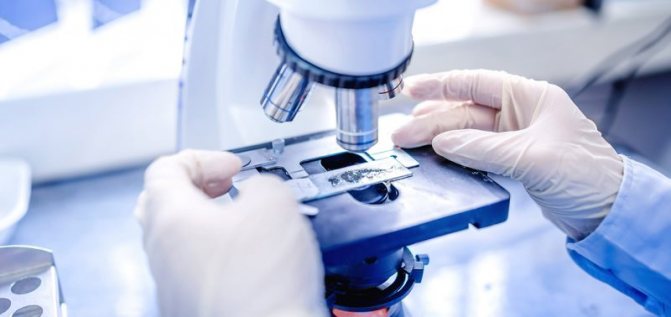
With the help of a systematic examination and passing all the necessary tests, it is possible to find out not only the presence of pathology, but also the cause of its occurrence. Only after this the doctor prescribes the correct treatment with the optimal course. Only through consistency in actions can you speed up the healing process and achieve long-term remission of the disease.
In addition, with the help of these diagnostic measures it is possible to identify concomitant diseases, if any, and determine their treatment.
Why are tests needed?
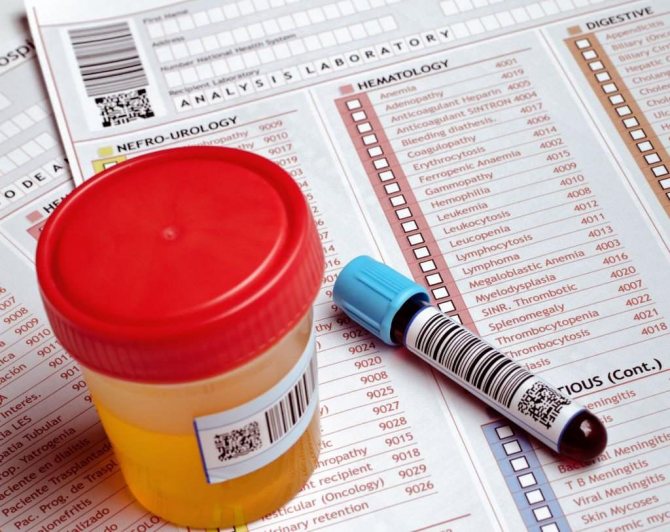
Often, research results reveal an infection that previously did not manifest itself symptomatically, but resulted in disorders of the immune system. Also, thanks to the tests, it is possible to identify the presence of contraindications to taking medications and using physiotherapy.
Since many psoriatic patients report worsening of the condition after exposure to an allergen, an immunogram and identification of triggers may be required. In rare cases, research results indicate that consultation with other doctors is required. For example, if you suspect psoriatic arthritis, you will need to be examined by an orthopedic doctor. Information about what tests are performed for psoriasis will be useful.
General tests to diagnose the disease
A general blood test for psoriasis is an integral study that helps diagnose the following blood parameters:
- Erythrocyte sedimentation rate.
- Decreased hemoglobin concentration.
- Leukocyte count.
The likelihood of detecting any deviations from the indicators indicates existing pathologies that need to be treated immediately. Since the etiology of psoriasis is not yet known, any information at the diagnostic stage will be useful.
Important! In case of psoriasis, blood assessment in an in vitro laboratory should be carried out in a timely manner and is used to adjust treatment.
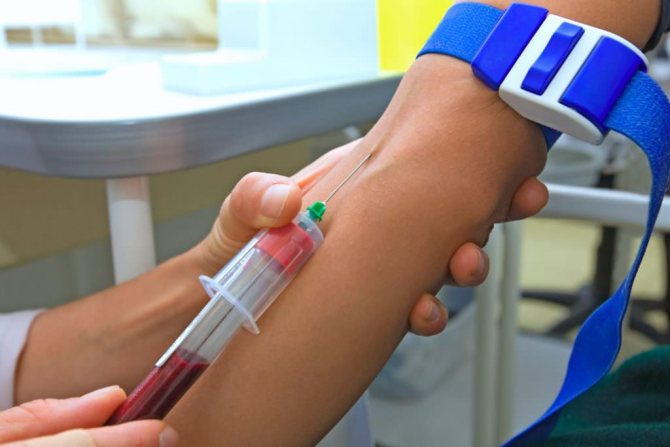
A biochemical blood test is responsible for the following indicators:
- high cholesterol;
- increased urea concentration;
- increase in salt content.
Using a urine test, a specialist determines the following indicators:
- the patient's water-salt balance;
- presence of crystals;
- monitoring the condition of leukocytes;
- urine density.
It is also necessary to have a stool culture tested for dysbacteriosis to exclude malfunction of the gastrointestinal tract. It is worth emphasizing that gastrointestinal disorders in psoriasis are diagnosed in almost all psoriatic patients.
Additional tests

Tests for psoriasis are also recommended for allergens. This is necessary to accurately determine the nature of skin lesions, adjust the diet and create a hypoallergenic environment.
Taking immunogram tests to determine a person’s immune status may be no less important. This will help determine whether the following pathologies are present:
- viral diseases;
- bacterial pathogens;
- malignant neoplasms;
- autoimmune lesions;
- endocrine system disorders;
- heredity.
It is worth emphasizing that autoimmune disorders are registered in 95% of people with psoriasis, and it is important to identify the problem at an early stage of diagnosis and begin treatment with immunosuppressants.
Additional examination
A blood test for psoriasis does not always help determine this disease in adults and children.
In these cases, additional examinations are prescribed:
- Psoriatic arthritis is detected using x-rays. Thanks to her, it is possible to understand how badly the joints are affected by the disease.
- Spinal lesions are detected using MRI.
- To determine neutrophilic leukocytosis, it is necessary to examine the synovial fluid of the joints.
- Sometimes psoriasis occurs in an atypical form, which makes it difficult to diagnose. In this case, a skin biopsy from the affected areas is indicated. To carry it out, the epidermis of 6 mm of skin is examined.
- To exclude a fungal infection, a potassium oxide test is prescribed.
- Women expecting a child are tested for prolactin, which helps determine whether there is a genetic predisposition to psoriasis or whether hormonal imbalances are the cause of the disease.
- Psoriasis rashes can be confused with a syphilis rash. To exclude this venereal disease, a blood test is taken for the Wasserman reaction.
- Other diseases are excluded by taking a culture test for the microflora of the mucous membranes.
What tests need to be taken
It is not always possible to diagnose psoriasis by external manifestations alone. Therefore, sometimes the doctor refers the patient for laboratory tests. Tests can also be prescribed during treatment to determine changes in the clinical picture and confirm the correctness of the chosen technique.
General examination
You can find out whether external symptoms belong to psoriasis using the following studies:
- A complete blood test that determines the level of hemoglobin and the number of leukocytes to detect the inflammatory process.
- A biochemical blood test, the indicators of which are needed to identify the level of uric acid and the presence of rheumatoid factor.
- General urine analysis to determine concomitant pathologies.
- Stool analysis to detect disorders of the gastrointestinal tract and the presence of parasites.
The list of mandatory laboratory tests also includes a blood test for HIV in order to exclude the influence of this virus on the course of the disease.
Additional examination
Sometimes, to clarify the picture of the development of psoriasis and determine the reasons that provoked it, the following procedures are required:
- Skin biopsy is the examination of a small fragment of the dermis taken from one or more affected areas.
- Bacteriological culture is required if psoriasis is detected on the mucous membranes.
- A blood test for syphilis, which, if the result is negative, will rule out this disease.
- Testing with potassium oxide is carried out if the presence of mycotic flora is suspected.
Diagnosis of psoriasis in children does not require special laboratory tests, as in adults. It is usually limited to taking a scraping from the affected area for a biopsy.
Changes in the joints, which are one of the manifestations of psoriatic arthritis, are detected using radiography.
What other tests can the doctor prescribe?
Symptoms of psoriasis manifest themselves individually in each patient and may be atypical for the disease. Therefore, some patients have to undergo the following tests:
- Blood test for allergies (Ig E).
- Analysis of synovial fluid from the joint.
- Immunological studies.
The diagnostic results make it possible to identify side factors that influence the course of the disease and adjust the method of its treatment.
Complete blood test for psoriasis
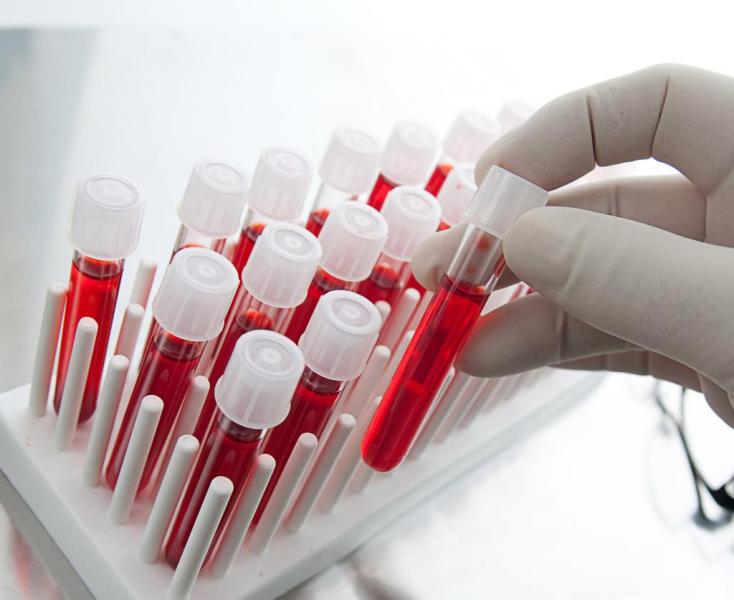
With the help of laboratory tests, it is possible to quickly exclude many serious diseases, some of their symptoms reminiscent of psoriasis. Thus, dermatitis, eczema, and syphilis are excluded.
Thanks to blood and urine tests, the infectious type of psoriasis and its phase are determined.
A blood test alone is not enough to determine the disease. But with its help, the disease can be suspected.
In addition, a general blood test helps to exclude pathological and allergic diseases.
If the ESR levels are very elevated, this means that the body is experiencing a chronic course of an autoimmune disease.
A person suffering from psoriasis needs to take a blood test at least once a quarter.
Tests for pregnant women
The appearance of symptoms of psoriasis in women during pregnancy is most often due to hormonal changes in the body and decreased immunity. Diagnosis is carried out on the basis of examination, study of the epicrisis and laboratory tests.
A woman undergoes most tests immediately after registering at the antenatal clinic. If psoriasis is suspected, an additional blood test for prolactin is prescribed, which makes it possible to identify a genetic predisposition to the disease.
Blood chemistry
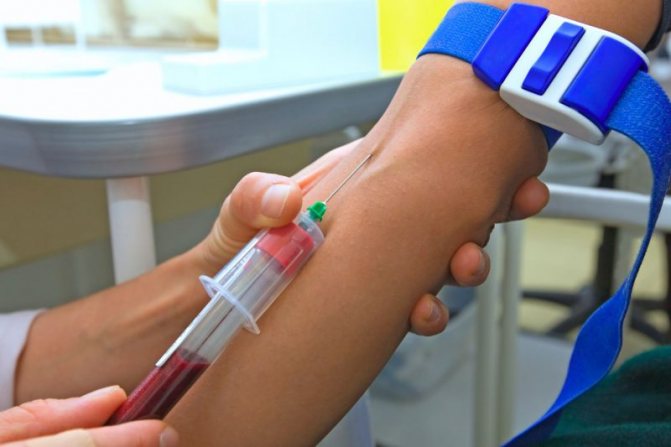
This study is also not specific. Protein fractions resulting from the inflammatory process are usually increased in psoriasis.
There are certain rules that must be followed when taking a biochemical blood test:
- The analysis must be taken strictly on an empty stomach. The last meal should be at least 8 hours ago.
- Due to the fact that blood counts change throughout the day, almost all tests are scheduled for the morning.
- The day before the test, the patient should not undergo serious physical activity.
- It is important to avoid stressful situations and emotional tension.
- You should not drink alcohol the day before donating blood.
- Before taking the test, you should refrain from smoking for at least 2-3 hours.
- Taking medications should also be as organic as possible. If you still need to take the medicine, you should inform the laboratory assistant and doctor.
It is very important to take all blood and urine tests before ultrasound and x-ray.
The most reliable test for psoriasis is a skin biopsy from areas affected by plaques.
Every person who has experienced psoriasis knows firsthand how many tests they have to undergo. It is important to understand that all these activities are not the whim of doctors. With the help of these tests, it is possible to clarify the situation about the disease and the general condition of the patient. Therefore, you should not neglect doctors’ orders. This will help achieve stable and long-term remission of the disease.
source
Preparation for analysis
To make a diagnosis, it is very important that all laboratory indicators are reliable and do not distort the true picture of the disease. Therefore, there are several rules for those who are tested for psoriasis:
- do not take medications for 10 days before the study;
- before taking material for biopsy, do not use ointments, creams and other external agents;
- the day before and on the day of the tests, do not smoke or drink alcoholic beverages;
- avoid unnecessary emotional stress.
Before taking blood tests, you must refrain from eating for 8-10 hours.
Differential diagnosis of psoriasis
Psoriasis is a complex autoimmune pathology. Therefore, before making this diagnosis, you need to be sure of it. To this end, every patient should be screened for psoriasis . It will help rule out other pathologies. Differential diagnosis of psoriasis is carried out according to the main syndrome of the disease – skin manifestations. Pathologies that have similar dermatological signs include:
- Various forms of dermatitis (seborrheic, atopic);
- Lichen planus;
- Syphilis;
- Reiter's disease;
- Athlete's groin;
- Neurodermatitis.
Psoriasis on the legs, which is rarely isolated, can be differentiated from vascular diseases. In addition to the main syndrome, attention should be paid to the nature of the pathology, the prevalence of skin rashes, and the general condition of the patient. Diff. Diagnosis of psoriasis should be carried out by a dermatologist. It is based on data from skin examination and laboratory tests. Diagnosis of psoriasis in children must be performed especially carefully. This pathology is rarely encountered in pediatric practice. In some cases, psoriasis develops during pregnancy, and special monitoring is required.
How to determine whether it is psoriasis or not?
It is necessary to identify psoriasis on the patient’s skin or some other disease as early as possible. This affects treatment tactics and prognosis. Psoriasis can be recognized by specific skin manifestations - plaques (photo 2). They are pink papules that rise above the surface of the skin. The progressive stage is characterized by the spread of spots and the appearance of silvery scales on them. The diagnostic algorithm is a sequential execution of studies.
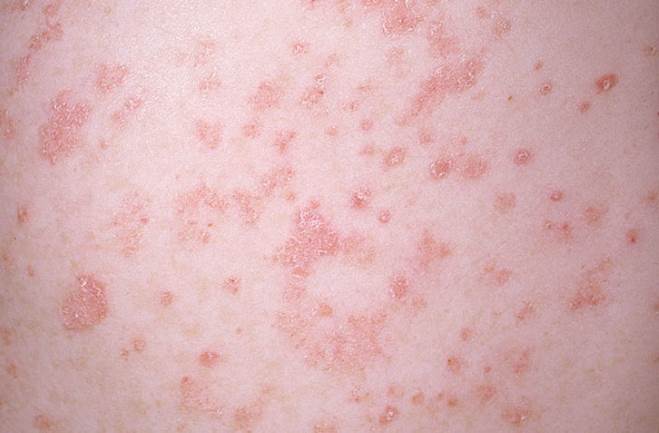
To recognize psoriasis in a child, the same methods are used for adult patients. First of all, the skin is examined. It is possible to determine psoriasis in a child only after performing dermatological diagnostic methods. Therefore, the pediatrician must refer the patient to a specialized dispensary. The examination plan for psoriasis includes the following points:
- Clarification of complaints and inspection;
- Special examination of the affected skin - dermoscopy;
- Laboratory tests - general and biochemical blood test, coagulogram, urine test;
- Skin biopsy for psoriasis.
Only after receiving the results can a conclusion be made. Diagnosis of nail psoriasis is based on laboratory methods and physical data. All examinations are important to identify the disease. The most important is a biopsy for psoriasis. It allows you to examine the affected areas of tissue.
How to diagnose psoriasis

In order to find out the accuracy of the diagnosis, psoriasis is diagnosed. As a result, the resulting tests are sent to the doctor, who interprets their results.
Formulating a diagnosis is usually not difficult if examination data for psoriasis is available. Important elements are not only blood tests and urine tests, but also a skin analysis, which is taken by scraping from areas of the skin affected by psoriasis.
Manifestations of psoriasis
| Skin | Itching, irritation, dryness, plaques, peeling |
| Internal organs | Inflammatory process, liver and kidney diseases |
| Psychological disorders | Complexes, phobias, stress, depression |
| Diagnostics | Unsatisfactory urine, blood and scraping tests |
Clinical studies of the disease
Based on the results of some tests, it is possible to accurately make a correct diagnosis. Dermatologists usually prescribe a general blood test, urine test, and some other tests. Testing for psoriasis also involves taking scrapings from the affected skin.
Using a general blood test, the doctor determines the presence or absence of psoriasis. Tests for psoriasis are quite reliable, so the specialist examines them first.
If there is a large amount of protein in the blood, inflammatory processes in the body can be determined. Therefore, analyzing a test for rheumatism is extremely important for diagnosing psoriasis. Biochemical analysis is also often prescribed by doctors to clarify the presence of pathology.
In order to determine what tests need to be taken if psoriasis is detected, it is best to consult a dermatologist. If this is not possible, then you can independently take a general blood and urine test, as well as blood biochemistry. After receiving test results, consultation with a dermatologist is mandatory.
In severe cases, the doctor will order a skin biopsy to determine the presence of abnormalities. In most cases, consultation with more than one doctor is required. Infectious disease specialist, rheumatologist, immunologist, dermatovenerologist - this is an incomplete list of doctors who you should contact if you suspect you have this disease.
Differential diagnosis of psoriasis
Diagnosis of psoriasis is carried out in a hospital setting. This is necessary to monitor treatment and exclude infectious diseases. The differential diagnosis of psoriasis and lichen planus is based on physical examination. Dermoscopy is also performed. Rash with lichen has a lilac tint, the center of the pathological focus is pressed inward, the edges of the papules are elevated. Pathological foci are localized on the flexor surfaces, in the groin area. Peeling of the skin is not pronounced.
Diff. The diagnosis of psoriasis and syphilitic lesions is based on the medical history and a special laboratory test - the Wasserman reaction. Papules in this pathology are hemispherical in shape and identical in size. Differential diagnosis of arthropathic psoriasis is carried out with Reiter's disease. This pathological condition is characterized by damage to the joints, urinary tract, and eyes. Diagnostics in the clinic includes monitoring the patient's condition. With Reiter's disease, the rash goes away faster and is more often localized on the genitals and in the oral cavity.
In the literature on dermatology you can find a special table for the differential diagnosis of psoriasis (photo in gal). It is based on skin syndrome. The formulation of the diagnosis includes the phase of the pathological process, the severity and clinical form of the disease. A diagnosis of psoriasis can only be made after assessing all indicators and long-term observation. Symptoms of this pathology persist for several months.
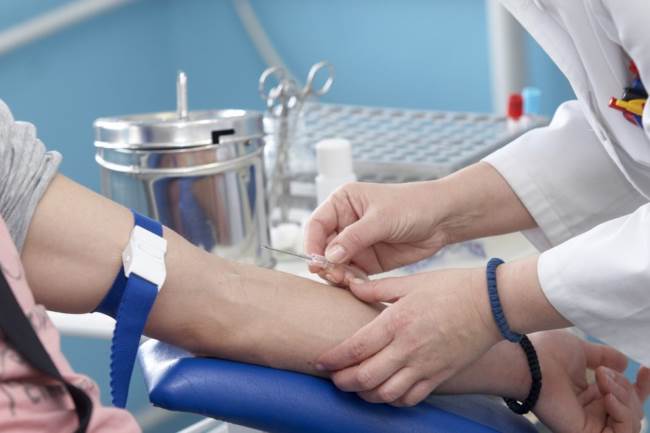
Blood test for psoriasis
Research into psoriasis begins with laboratory diagnostic methods. They help to quickly exclude diseases such as syphilis, dermatitis, and allergic skin pathologies. What tests need to be taken for psoriasis? For diagnosis, it is necessary to perform blood and urine tests. With their help, it is possible to determine the infectious nature of the pathological condition and the phase of the process. It is impossible to determine psoriasis using a blood test. However, it helps to suggest this diagnosis.
A general blood test indicates the presence of an inflammatory process of bacterial or viral etiology. These findings are nonspecific and therefore cannot be used to make a diagnosis. A blood test for psoriasis will show an increase in the number of leukocytes and an acceleration of ESR, in some cases there is a decrease in hemoglobin. It will help eliminate viral pathologies and allergic diseases. ESR in psoriasis can be greatly increased. This is due to the presence of chronic autoimmune inflammation. You should donate blood for psoriasis 2-4 times a year. The study allows you to monitor the activity of the inflammation process.
A biochemical blood test for psoriasis is also not specific. It will show an increase in protein fractions responsible for the inflammatory process. Rheumatoid factor must be negative. The most reliable test for psoriasis is a skin biopsy from the surface of the plaques. Histological examination allows us to make a final conclusion.
Is it possible to donate blood if you have psoriasis?
Tests are performed regularly for psoriasis. With the help of these studies, the doctor evaluates the dynamics of the pathological process and treatment. Some patients are interested in the question: is it possible to donate blood if you have psoriasis? Only the attending physician can answer this question. It all depends on the tests that the patient has at the moment. If no changes are observed, you should consult a transfusiologist.
Patients often wonder: is it possible to get psoriasis through blood? The likelihood of transmitting this pathology is low, but infection is possible. If the inflammatory process is in the active phase, donating blood is prohibited for psoriasis. The disease is characterized by the accumulation of immune complexes that are aimed at destroying one's own skin cells. In the active stage of the process, pathological antibodies can cause infection in a person who has not been sick before.
You should be especially careful when prescribing treatment for psoriasis in children, because the treatment of this disease uses hormones that are harmful to the growing body. A dermatologist, together with a pediatrician, should select and change the dosage of medications.
What is included in the additional examination?
To determine some forms of psoriasis, a visual examination is sufficient. Formulating a final diagnosis is impossible without laboratory tests and instrumental diagnostic methods.
Blood test
Blood testing is always included in the complex of diagnostic procedures. In the early stages of the disease, there are no changes in the blood count, but with extensive lesions and a prolonged course, the following is noted:
- increased ESR;
- decreased hemoglobin levels (anemia);
- increase in the number of white blood cells (leukocytosis).
There are examples when inflammatory changes in the general blood test appear against the background of small foci, at the very beginning of the disease - this indicates the presence of concomitant pathology.
Biochemical blood test
Such a blood test allows you to find out what causes the disease: increased cholesterol levels, increased urea concentrations, increased salt content. A biochemical blood test is carried out in vitro, it helps to exclude the rheumatoid nature of the disease.
For reference! For psoriasis, it is necessary to take blood tests regularly - dynamic monitoring of indicators allows you to adjust treatment.
Urine examination
Since psoriasis affects metabolic processes in the body, a general urine test helps to get an idea of the patient’s level of water-salt balance. The detection of crystals and sedimentary salts indicates a severe course of psoriasis.
For reference! Psoriasis often leads to inflammatory processes in the kidneys, so a general urine test may detect leukocytes and a decrease in urine density. It is necessary to do a study before each visit to the doctor.
Coagulogram
Common psoriasis, psoriatic erythroderma and arthritis lead to bleeding disorders. In particular, increased prothrombin activity and increased concentrations of fibrinogen and its breakdown products indicate blood thickening and the risk of thrombosis. The table shows examples of the norm.
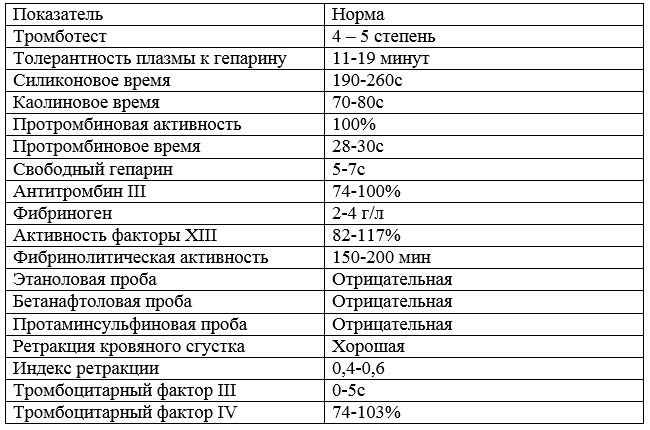
A coagulogram serves only as an additional research method; these studies are necessary to correct treatment.
Immunogram
An immunogram allows you to determine the effectiveness of the immune system; the study is carried out in vitro. You can take such an analysis either on your own initiative or as prescribed by a doctor. With psoriasis, there is a decrease in the level of T-lymphocytes and an increase in the activity of neutrophils (normal values in the table).
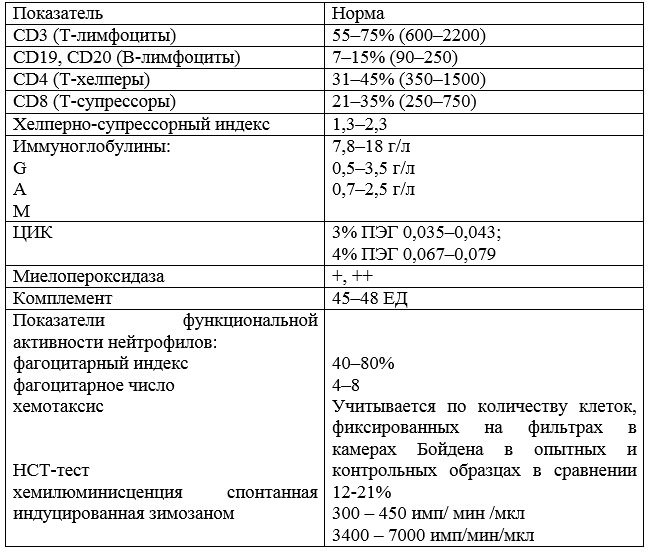
More information is provided by the total immunoglobulin E (IgE) indicator. A significant increase in IgE is observed in 70% of patients with psoriasis vulgaris. In some cases, psoriasis occurs against the background of normal IgE levels.
For reference! An increase in total IgE is possible in various diseases, in particular allergies and helminthiasis. The IgE indicator data must be interpreted in conjunction with the indicators of other tests.
The range of diagnostic procedures also includes determining the level of specific IgE. The need for such a study is due to the important role of the allergic factor in the development of psoriasis; this is useful for correcting the diet. The study allows us to determine which allergens cause a pathological reaction.
Fact! Standard skin tests for allergens are contraindicated in patients with psoriasis.
Specific IgE to various allergens is determined by in vitro blood testing. However, the detection of a certain type of IgE does not mean the presence of an allergy to a specific product; false negative results are also possible. It is inappropriate to draw conclusions based on one specific IgE; it is recommended to rely on medical history data.
Nuance! There are examples when allergic reactions occur without an increase in general and specific IgE.
Blood test for histocompatibility antigens
All patients with psoriasis need to donate blood for such a study. The test indicators allow us to judge the risk of joint damage based on the presence of specific antigens.

